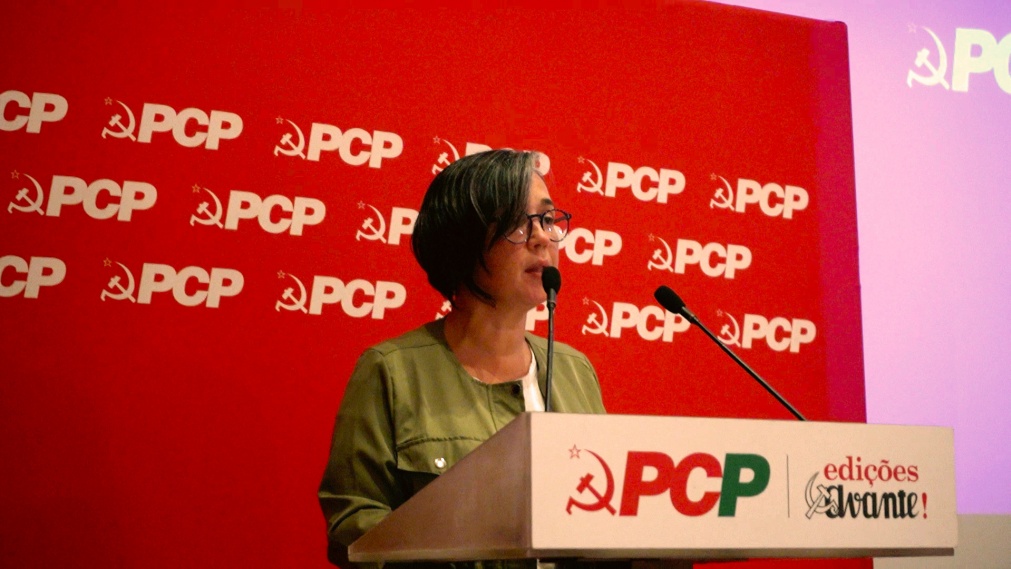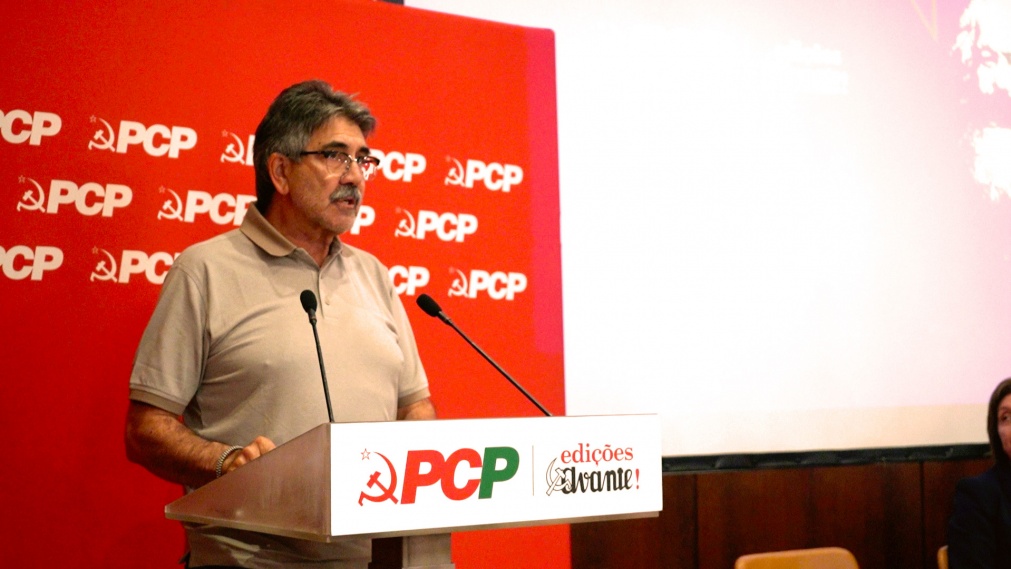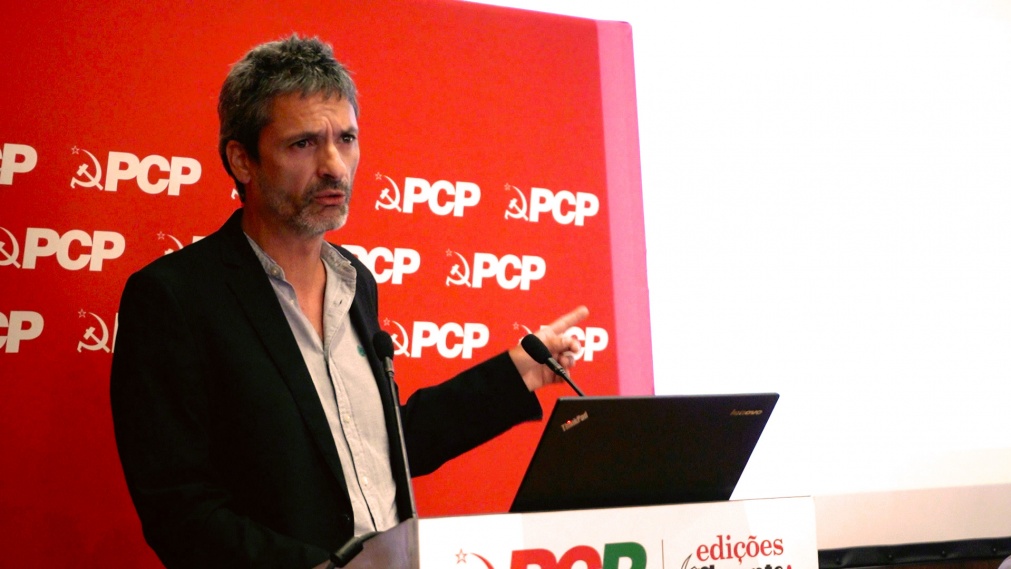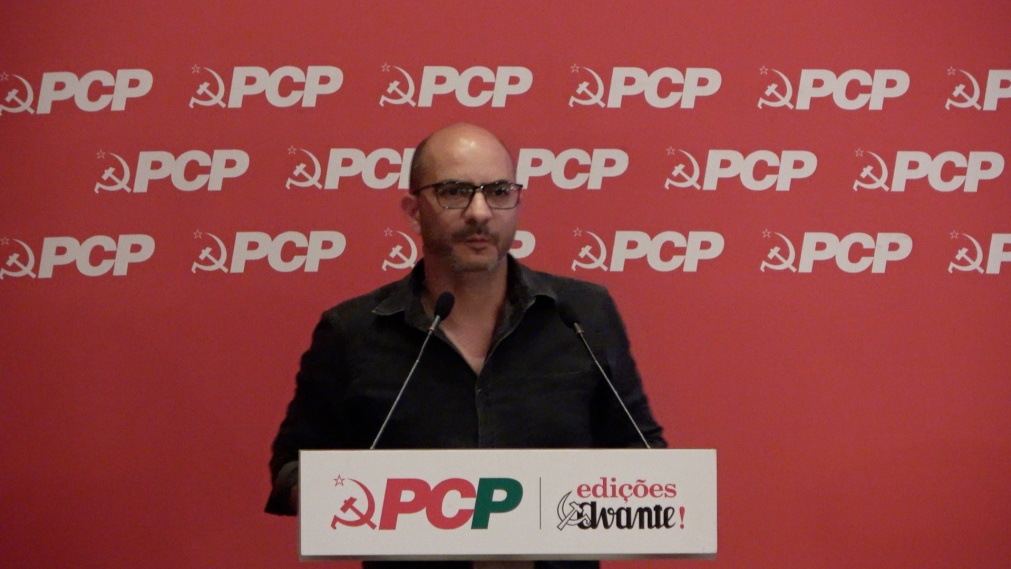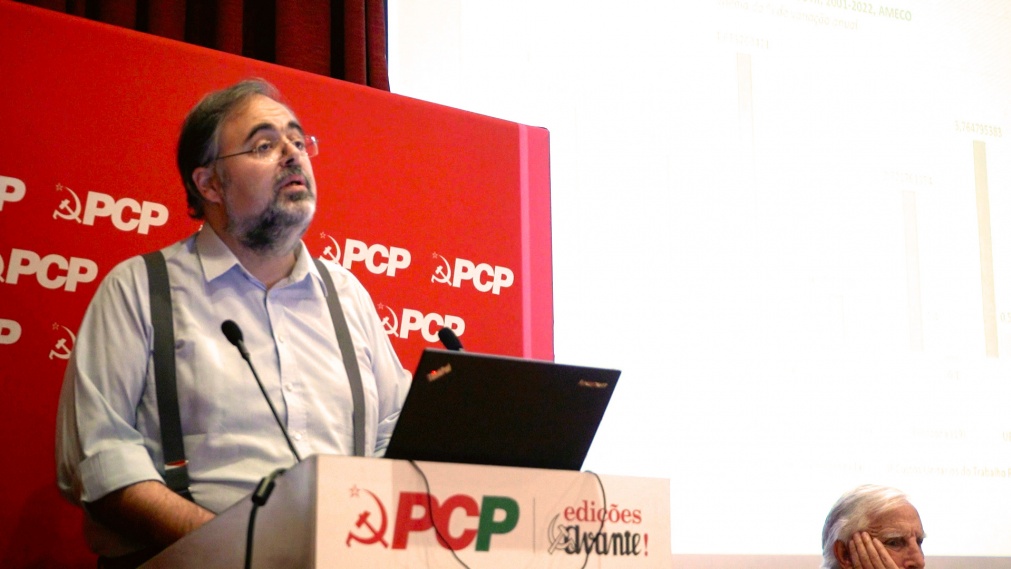First, I would like to thank the valuable contribution of all those who shared their opinions here on fundamental issues that span Portuguese society, from the world of labour to economic and social relations.
Opinions on unavoidable and highly topical issues.
The people and the country are rocked by a higher inflation than has been admitted, lengthier than some announced and certainly unfairer in the distribution of its impacts than they would have us believe.
The starting point for this debate was Marx's text, “Wage, Price and Profit”.
A text prepared for a lecture he delivered in two sessions in the month of June 1865, before the General Council of the First International Working Men’s Association, otherwise known as the First International.
Marx's lecture arose from the need to guide the practical activity of the First International and contribute to the understanding in all its essence of the functioning of capitalism.
Some may find it strange to recall today a text that is around 150 years old.
Marx made and still makes a decisive contribution to economic science, to the understanding of economic processes and laws, of facts and events that marked the course of humanity. Central aspects for those who want to intervene on the reality, beyond the conjuncture and look of things.
In that First International there was someone (Mr. Weston) who defended that it was not worth the workers and the trade unions to fight for the increase of wages, because this increase would raise the price of the goods.
That is, what the workers gained with the increase in wages they lost when they bought at a higher price the goods necessary for their survival and, therefore, it was better to remain still.
Marx's Report read at that meeting dismantles the falsehood of this argument and highlights the importance of the “economic” and political struggles that workers needed to carry out.
A remarkable document and a first statement of the theory of surplus value.
It is curious that, after more than 150 years, there are those in this world, including in Portugal, who present themselves as innovators and continue to claim that raising wages leads to rising prices, which fuels inflation and creates unemployment.
Raising wages is evil and Capital's profit is untouchable, this is the old canon.
As Marx writes, "A general rise in wages would therefore result in a fall in the general rate of profit but would not affect the values" of commodities.
There you have it, no law obliges the prices of commodities to rise with the evolution of wages, there is always the possibility that profits will fall.
But as we are witnessing every day, Mr. Weston left many heirs in Portugal and around the world.
From Costa to Montenegro, from Lagarde to Ursula Von der Leyen, from Centeno to António Saraiva.
When we now hear about putting a rein on wage growth so as not to feed the “inflationary spiral”, we understand the old and outdated reasoning.
Reasoning also used when inflation soared in the last years of the fascist dictatorship of Marcelo Caetano, the result of the colonial war and an economy that was also growing at the time.
Álvaro Cunhal then commented in an interview with Rádio Portugal Livre, in January 1972: «Marcelo Caetano, playing the very old record of the “infernal cycle”, now says he has discovered that the root of all difficulties, “cancer” (as he quickly called) (…) is inflation and that inflation is caused by the “dangerous mentality of claims” of the workers.»
The workers, claiming the «impossible», would, in the end, be responsible for the rise in prices and the «inflationary process».
Regardless of the form and tone of each one, they never question the dimension of the hallowed profit of economic groups and multinationals.
God forbid those who dare touch it. Not even lightly with a light Corporate Tax rate. Their profit values are defined by the heavenly “markets” and therefore unquestionable… Wages are not.
Wages are the price of a commodity to be regulated by the State, to be negotiated by capital in social dialogue.
In the shadow games that capital promotes in the media, profits have nothing to do with wages or with the prices of goods and services that the workforce produces.
Witness the vicious editorials and analysts against those who challenge the scandalous size of the profits of GALP, EDP, REN, Jerónimo Martins, SONAE, banks or the many multinationals established in our country.
Vítor Bento, chairman of the Portuguese Association of Banks, does not know “what excessive profits are” and speaks of “an ideological campaign against banking profits”.
Absolutely remarkable statements after the banks posted 2.6 billion euros in profits in 2022, a 71% increase compared to 2021. A brutal growth in the financial margin, 9.5 times higher than the European average.
Portugal holds 2nd. place among those that pay the least for bank deposits and the 8th. that charges the most on loans. It is stuffing up on both sides, in fact stuffing up everywhere as is the case with unjustified banking fees.
Based on the figures known in this 1st. quarter, banks will increase results in 2023, and for them it is never enough.
According to the Portuguese Association of Banks: «Anything below a profit of 3 billion euros means that banks are not obtaining sufficient profitability».
An objective at the expense of wages, purchasing power, the country's GDP, investment, exports and the evolution of the Portuguese economy.
The inflationary surge we have been dealing with since 2021 emerges in the terminal phase of the pandemic and before the intensification of the war in Ukraine.
As we learned from Marx, the main cause of inflation is the reduction in supply caused by difficulties in the productive apparatus, namely the lack of investment by capitalists and/or the displacement of capital to more profitable financial operations/speculations (high interest rates), or even other unforeseen disturbances in the productive apparatus and distribution of goods, as happened with the pandemic, the war and now the sanctions.
And this is the reality associated with the brazen use by monopoly and oligopolistic economic groups, producers and suppliers of essential goods, with strong market power, to increase commercial margins and even practice speculative prices. Studies and analyses carried out by so-called undisputed bodies – such as the ECB and the Bank of Portugal – confirm that, in addition to inflation, we have taking advantage of inflation.
The prescription by big capital – as demonstrated here throughout the afternoon – is the containment of wages and investment, and the accelerated rise in interest rates, as the ECB is doing.
That is, the protection of profits and interests of economic groups and multinationals, and the destruction of the living conditions and impoverishment of the workers and people.
A path that affects economic activity, micro, small and medium-sized companies and also the country, whose foreign debt is large and well-known.
It is not possible to fight this inflationary surge without tackling the causes behind the rise in prices.
As we have insisted, there is an urgent need for a general increase in wages and pensions, recovering lost purchasing power and putting an end to the impoverishment imposed on the population at large.
The PS Government, like the PSD, CDS, Chega and IL, rejects all proposals that may confront the interests of Capital, opting for temporary and welfare measures, small supports that, although useful for those who receive them, do not solve the fundamental problems nor do they touch on a profoundly unfair distribution of wealth that is increasing.
The so-called decent work agenda, which has already been unmasked here today, overlooks the central problems and is nothing more than a new instrument to heighten exploitation even if involved in soft and deceptive words.
Raising wages is a national emergency, it was before this inflationary surge, and even more so now with the erosion of purchasing power. It is urgent therefore to give young people the conditions to remain in the country, countering the high level of emigration, and to start a family if that is their choice, in order to respond to the demographic deficit we are facing.
This is done with better wages, effective bonds, better working conditions.
It is by raising wages that we can prevent workers from living in poverty.
If all poverty must be fought, the poverty that affects those who have a work contract demonstrates with particular cruelty how low the incomes are and the urgency to increasing them.
A policy that demands an option for the interests of workers, for those who produce wealth and are the vast majority of society.
A condition of development and decisive for a fairer distribution of wealth.
An option clearly at odds with the interests of economic groups and multinationals.
An option of rupture with the economic model based on low wages, precariousness and deregulation of working hours and the labour legislation associated with it.
An option for an immediate increase in the National Minimum Wage to 850 euros and a significant increase in the average salary, achieving convergence with the Euro zone average in five years. An option for valuing professions and careers and increasing salaries in Public Administration.
An option that requires the regulation of prices of essential goods and services.
We are witnessing the mystification that price reductions can be achieved by lowering taxes.
The cut on ISP fuel tax, or zero VAT on various food products, reveal the fallacy of this talk. They did not stop the rise in prices in these months, they reduced tax revenue and ensured the scandalous profits of economic groups and multinationals.
The regulation of prices of essential goods and services is possible and necessary in the current context.
This is what we propose in relation to food and the margins of large retail, energy, telecommunications, housing, bank loans that strangle more than one million and one hundred thousand families with the worsening of interest rates.
The State must intervene in the market, not to benefit big interests as it has done. The State must intervene to protect the people against inflation, micro, small and medium-sized companies against predation by monopoly groups, small agricultural producers and fishermen against the increase in the cost of production factors.
The PCP does not abdicate defending a fairer fiscal policy. An option that relieves the workers and the people, and that effectively taxes big capital, namely the special taxation on scandalous profits.
It is necessary to combat and contain the impacts of inflation, but reality also calls for measures that seek to combat its causes.
The country's growing foreign dependence, existing structural deficits, particularly the production deficit; the dominance of monopoly capital over the strategic sectors of the national economy which, through privatisations, expropriated the country from instruments of economic intervention in strategic areas; submission to the Euro and loss of monetary sovereignty and a sovereign central bank, with the capacity to issue currency, set interest and exchange rates, turned Portugal into an increasingly peripheral country and exposed to the instability and disruptions that mark the international economy .
This path, more than the «protective shield» that some announced, turned our country into one of the weakest links.
Fighting the causes of inflation requires, as in other areas, a break with right-wing policies.
It implies a State policy that values national production, promotes the substitution of imports, limiting “imported inflation” as much as possible and reducing external dependence.
It requires, as we have stated, the recovery of public control of strategic companies and sectors that are today essentially in the hands of national economic groups and foreign capital. A break that does not dispense with advancing towards the recovery of instruments of budgetary, exchange rate and monetary sovereignty.
Portugal must ensure the diversification of its economic activity and its external relations, it must use the available resources, and those to be created, to increase the well-being of workers and the people, it must strive for a policy of peace and cooperation contrary to the dangerous escalation that is underway.
This is the path that serves the country and not that of alignment with the interests of imperialism of confrontation, war and sanctions that are contributing to rising prices; just as it does not serve the country to be subject to draconian debt compression criteria, the deficit and the increase in interest rates by the ECB.
The country's submission, including the mobilisation of national resources for the intensification of the war, also has an economic and social cost that has been paid and is being paid by the Portuguese workers and people.
I would like to end with one of the questions raised by the work that brings us here today, “Wage, price and profit”.
Marx did not limit himself to unveiling the main working mechanisms of capitalism, in themselves of remarkable importance.
He identified the decisive question, workers are not, cannot be mere spectators of the world.
On their strength, their unity, their struggle depends not only improving their living conditions, but also the evolution of the course of history, in confrontation with injustices and exploitation and in the affirmation of a fairer, more democratic and progressive society, of a society without exploiters or exploited.
The workers' struggle, the role of the unitary trade union movement that was highlighted here today, is today an irreplaceable factor.
Marx's work “Wage, Price and Profit” fulfils a dual role. It both values the workers' struggle for wage increases and shows the limitations of this struggle, placing the need for a more general political struggle to overcome capitalism.
In this struggle for the transformation of society, the working class and all workers will find the Portuguese Communist Party on their side.
A Party that assumes itself through its path, its ideology, its practice, its project, as the great force embodying a patriotic and left-wing alternative policy.
That assumes itself as an aggregating force of those who assume the need to break with right-wing policies, as the Party of the April Values, placing them as unavoidable factors of the advanced democracy for which we fight, with socialism and communism on the horizon.
Long live the Portuguese Communist Party!






